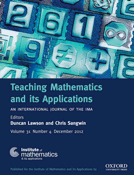
Teaching Mathematics and Its Applications
Scope & Guideline
Enhancing Education with Cutting-Edge Mathematics Insights
Introduction
Aims and Scopes
- Innovative Teaching Practices:
Focuses on the development and assessment of new pedagogical strategies to improve mathematics teaching and learning outcomes. - Integration of Technology:
Explores the role of digital tools and online resources in facilitating mathematics education and enhancing student engagement. - Mathematics Anxiety and Student Engagement:
Investigates the psychological aspects of learning mathematics, including anxiety, motivation, and engagement strategies. - Collaborative Learning and Modelling:
Emphasizes the importance of collaborative learning environments and mathematical modeling as effective teaching strategies. - Professional Development for Educators:
Addresses the continuous professional development of mathematics educators and support staff to improve teaching practices. - Assessment and Feedback Mechanisms:
Examines various assessment methods and feedback mechanisms to evaluate student learning and improve educational practices.
Trending and Emerging
- Gamification in Mathematics Education:
Recent studies emphasize the integration of gamification techniques to enhance student engagement and motivation in learning mathematics. - Online and Hybrid Learning Environments:
The shift towards online and hybrid learning models has become a focal point, examining best practices and challenges in delivering mathematics education remotely. - Focus on Inclusivity and Diversity:
Emerging research highlights the importance of inclusive teaching practices that cater to diverse student populations and address equity in mathematics education. - Mathematical Modelling and Real-World Applications:
There is an increasing trend toward exploring mathematical modeling as a critical tool for understanding complex real-world problems, fostering critical thinking and problem-solving skills. - Impact of COVID-19 on Mathematics Learning:
Studies analyzing the repercussions of the COVID-19 pandemic on student learning and engagement in mathematics have gained prominence, focusing on both challenges and adaptations.
Declining or Waning
- Traditional Lecture-Based Instruction:
There has been a decline in research focused on traditional, lecture-based teaching models, as the emphasis shifts towards interactive and student-centered approaches. - Basic Skills and Drill Practices:
Research on rote learning and basic skills drills is diminishing, indicating a preference for deeper conceptual understanding and application of mathematics. - Standardized Testing Methods:
Publications addressing conventional standardized testing methods are becoming less frequent, reflecting a growing interest in alternative assessment strategies. - Mathematics Competitions and Performance:
There is a noticeable decrease in the focus on mathematics competitions and performance metrics, as the journal pivots towards more inclusive and holistic educational practices. - Pure Theoretical Mathematics Teaching:
A waning interest in papers solely focused on pure theoretical approaches suggests a shift towards applied mathematics and its real-world relevance.
Similar Journals

Teaching of Mathematics
Exploring New Frontiers in Mathematics EducationTeaching of Mathematics is an esteemed open-access journal devoted to the field of mathematics education, published by DRUSTVO MATEMATICARA SRBIJE in Serbia. Since its inception in 1998, the journal aims to foster scholarly dialogue and disseminate research findings that contribute to the effective teaching and learning of mathematics. Although it currently holds a Q4 ranking in both Education and Miscellaneous Mathematics categories, the journal is dedicated to providing a platform for innovative pedagogical strategies, theoretical discussions, and empirical studies. With an ISSN of 1451-4966 and an E-ISSN of 2406-1077, Teaching of Mathematics offers open access to its content, ensuring that researchers, educators, and students can freely benefit from its contributions. As it converges towards 2024, the journal aspires to enhance its impact and influence within the mathematical education community, encouraging all stakeholders to share their insights and advancements in this critical area of study.

Journal fur Mathematik-Didaktik
Shaping the Future of Mathematics LearningJournal für Mathematik-Didaktik, published by Springer Heidelberg, is a leading academic journal that has been at the forefront of mathematics education research since its inception in 1980. Operating under ISSN 0173-5322 and E-ISSN 1869-2699, this esteemed journal serves as a platform for disseminating rigorous research findings, innovative teaching methods, and theoretical frameworks aimed at improving mathematics instruction. With a notable Q2 ranking in both Education and Mathematics (miscellaneous), the journal has gained recognition for its impactful contributions, evidenced by its position within the 75th percentile in General Mathematics and >50th percentile in Social Sciences Education on Scopus. Scholars and practitioners benefit from its commitment to advancing educational practices, while readers enjoy access to a wealth of knowledge that addresses current challenges and trends in mathematics teaching and learning. Designed for educators, researchers, and students alike, the Journal für Mathematik-Didaktik is an essential resource for those looking to enhance their understanding and practice in the ever-evolving field of mathematics education.

STUDIA MATHEMATICA
Connecting Global Minds Through Mathematical ResearchSTUDIA MATHEMATICA is a distinguished journal published by the Polish Academy of Sciences Institute of Mathematics - IMPAN, dedicated to advancing the field of mathematics since its inception. With an ISSN of 0039-3223 and an E-ISSN of 1730-6337, this journal serves as a significant forum for mathematicians worldwide to disseminate innovative research and theoretical advancements. Operating under a stringent peer-review process, STUDIA MATHEMATICA boasts a commendable impact factor that places it in the Q2 category within the mathematics discipline, indicating its critical role in the academic community. Covering a broad spectrum of mathematical topics, the journal aims to encourage interdisciplinary collaboration and foster a deeper understanding of both applied and theoretical aspects of mathematics. Researchers, professionals, and students alike will find a wealth of knowledge in its pages, contributing to the development of the mathematics field from its base in Warsaw, Poland. As it converges various strands of mathematical thought from 1996 to 2024, STUDIA MATHEMATICA continues to uphold its reputation as an essential resource for contemporary mathematical scholarship.

International Journal of Science and Mathematics Education
Connecting Research and Practice for Global ImpactWelcome to the International Journal of Science and Mathematics Education, an esteemed publication that has served as a vital platform for cutting-edge research in the fields of science and mathematics education since its inception in 2003. Published by SPRINGER in the Netherlands, this journal has consistently established itself in the top tier of academic publishing, as evidenced by its ranking in the Q1 category for both Education and Mathematics (miscellaneous) in 2023. With an impressive Scopus ranking placing it at #26 in General Mathematics and #269 in Social Sciences Education, the journal is a must-read for researchers, educators, and policymakers dedicated to enhancing the teaching and learning of mathematics and science. Although not open access, the journal is committed to disseminating high-quality research that bridges theory and practice, fostering innovative approaches and collaboration within the academic community. By supporting empirical studies, methodological advancements, and theoretical discussions, the International Journal of Science and Mathematics Education plays a crucial role in shaping educational practices and policies worldwide.

Mathematics Enthusiast
Exploring innovative research in the world of numbers.The Mathematics Enthusiast is a premier open-access journal published by the University of Montana, Department of Mathematical Sciences, dedicated to advancing the field of mathematics through a diverse array of scholarly articles. With its ISSN 1551-3440 and established presence since 2013, the journal aims to foster a collaborative environment for researchers, educators, and students alike by showcasing innovative research and contemporary discussions in the realm of mathematics. As a recognized entity within the field, it holds a category quartile ranking of Q4 in miscellaneous mathematics disciplines and is indexed in Scopus, positioned at Rank #188 out of 399, representing the growing interest and research impact in the mathematical community. The journal is committed to exploring cutting-edge topics and promoting mathematical literacy across various sectors while engaging readers with both theoretical and practical implications of mathematical research. For those interested in the evolving landscape of mathematics, The Mathematics Enthusiast is an essential resource, contributing significantly to academic discourse and professional development.
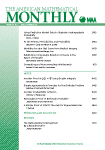
AMERICAN MATHEMATICAL MONTHLY
Championing Innovative Mathematical DiscourseAMERICAN MATHEMATICAL MONTHLY, published by Taylor & Francis Inc, is a prominent journal in the field of mathematics, recognized for its contribution to the dissemination of mathematical knowledge and pedagogy. With its ISSN 0002-9890 and E-ISSN 1930-0972, this journal has been a cornerstone for mathematicians since its inception, continuing to provide scholarly articles, educational materials, and insights into contemporary mathematical research. Although it follows a subscription model without Open Access options, its Q2 ranking in the Mathematics (miscellaneous) category reflects its reputable standing among peers, emphasized by its Scopus rank in the 22nd percentile. Based in the United States at 530 Walnut Street, Ste 850, Philadelphia, PA 19106, the journal spans topics that cater to both advanced researchers and aspiring students, facilitating an engaging dialogue within the mathematical community.

Journal of Mathematics Teacher Education
Advancing Knowledge in Mathematics Teacher EducationJournal of Mathematics Teacher Education, published by SPRINGER, serves as a pivotal platform for scholarly communication in the fields of Education and Mathematics. With a distinguished Q1 ranking in both disciplines and exceptional Scopus rankings—placing it in the top 94th percentile for Mathematics and the 84th percentile for Education—the journal is dedicated to advancing research and practice in mathematics education from a global perspective. Established in 2005 and converging towards 2024, it invites contributions that investigate innovative teaching strategies, curriculum development, and teacher education methodologies. Although the journal does not offer Open Access, its rich collection of empirical studies, reviews, and theoretical articles provides invaluable resources for educators, researchers, and students aiming to elevate the quality of mathematics instruction. Situated in Dordrecht, Netherlands, the Journal of Mathematics Teacher Education remains a significant asset to the academic community, fostering discussions that drive progress and enhance student learning experiences.
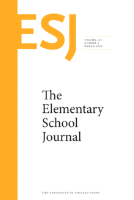
ELEMENTARY SCHOOL JOURNAL
Empowering Research for Young MindsElementary School Journal, published by University of Chicago Press, is a leading academic journal focused on the field of education. With an ISSN of 0013-5984 and an E-ISSN of 1554-8279, this esteemed publication ranks in the top quartile (Q1) of educational journals, reflecting its influential role in shaping educational research and practice. Covering diverse topics integral to elementary education, the journal provides a platform for innovative research and discussions that aim to enhance teaching and learning experiences in the early years of schooling. With a Scopus ranking of #628 out of 1543 in the Social Sciences and Education category, the journal is positioned as a pivotal resource for researchers, educators, and policy-makers committed to advancing knowledge in this critical area. Although not an open-access publication, the journal offers valuable insights backed by rigorous scholarship, making it a vital part of academic collections across the globe. We invite scholars and practitioners alike to contribute to and benefit from the rich body of work published in this journal, which has been operational from 1996 and will continue its impactful journey through 2024.
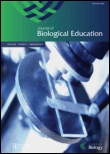
JOURNAL OF BIOLOGICAL EDUCATION
Empowering Educators through Cutting-Edge ResearchThe JOURNAL OF BIOLOGICAL EDUCATION is a prominent academic journal published by Routledge Journals, Taylor & Francis Ltd, focusing on innovative research and practices in the field of biological education. With an ISSN of 0021-9266 and E-ISSN 2157-6009, this journal serves as a vital resource for educators, researchers, and students dedicated to enhancing the teaching and learning of biology. Since its inception in 1967, it has maintained a consistent commitment to promoting best practices and integrating new methodologies into biological curriculum design and pedagogy. The journal holds a respectable impact factor and ranks in the Q2 category for both Agricultural and Biological Sciences and Education, reflecting its influence and authority within these fields. Researchers are encouraged to engage with its diverse range of articles that address critical issues in biological education, showcasing cutting-edge research and practical approaches. Its reach is particularly significant in the United Kingdom and globally, making it a key platform for disseminating knowledge and fostering collaboration among professionals.
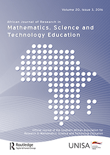
African Journal of Research in Mathematics Science and Technology Education
Empowering Educators Through Rigorous ResearchAfrican Journal of Research in Mathematics Science and Technology Education is a distinguished academic journal, published by Routledge Journals, Taylor & Francis Ltd, dedicated to advancing knowledge in the fields of mathematics, science, and technology education within the African context. With an ISSN of 1811-7295 and an E-ISSN of 2469-7656, this journal has been a crucial platform for scholarly discourse since its inception in 1997, steadily gaining reputation and impact among researchers, educators, and policymakers. The journal features a rigorous peer-review process, ensuring that high-quality research garners visibility across various disciplines, as evidenced by its Quartile rankings in Computer Science Applications, Education, Engineering, Mathematics, and Physics and Astronomy. With its commitment to serving the educational community and fostering innovative practices, the African Journal of Research in Mathematics Science and Technology Education plays a pivotal role in shaping the future of STEM education in Africa and beyond.